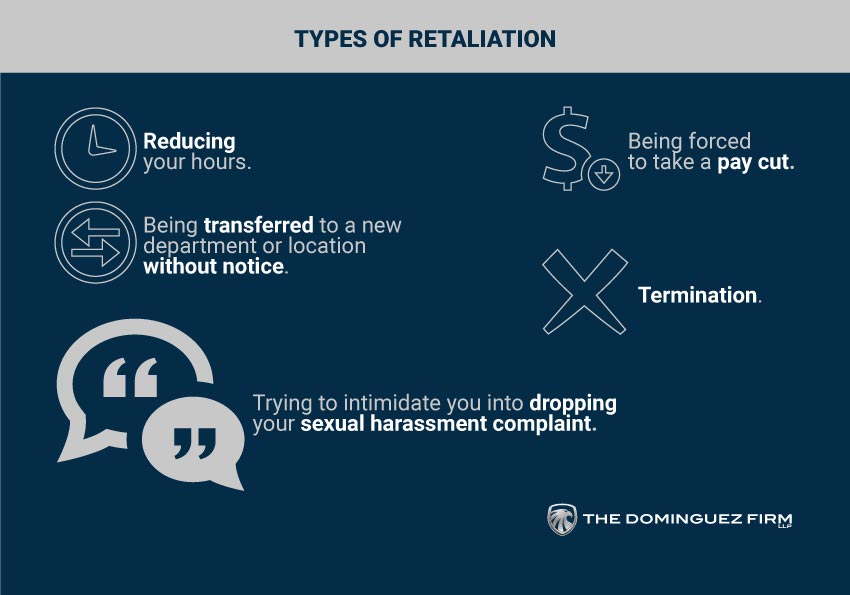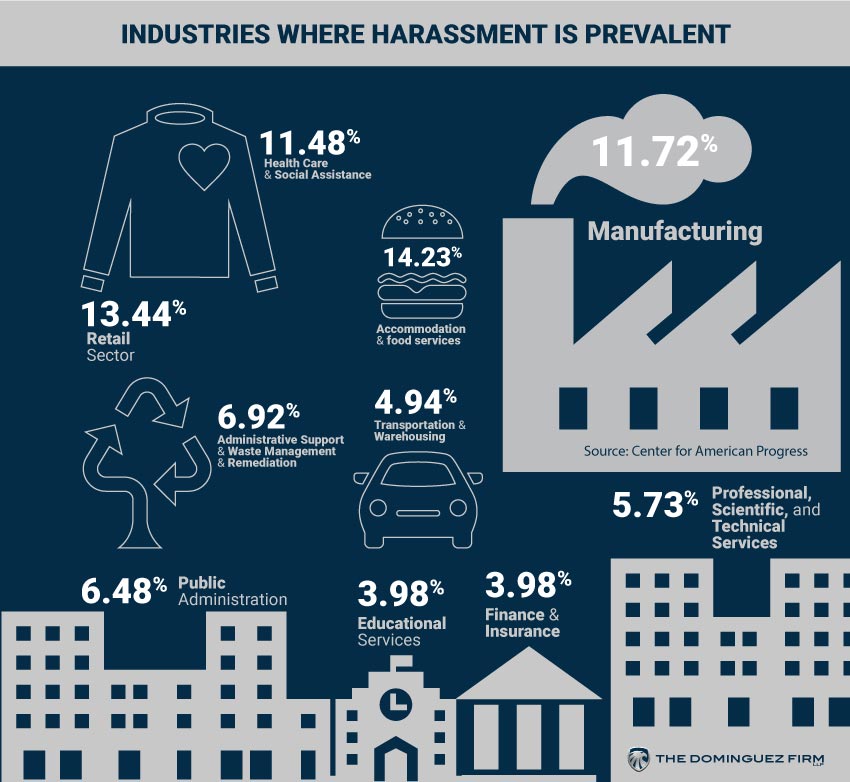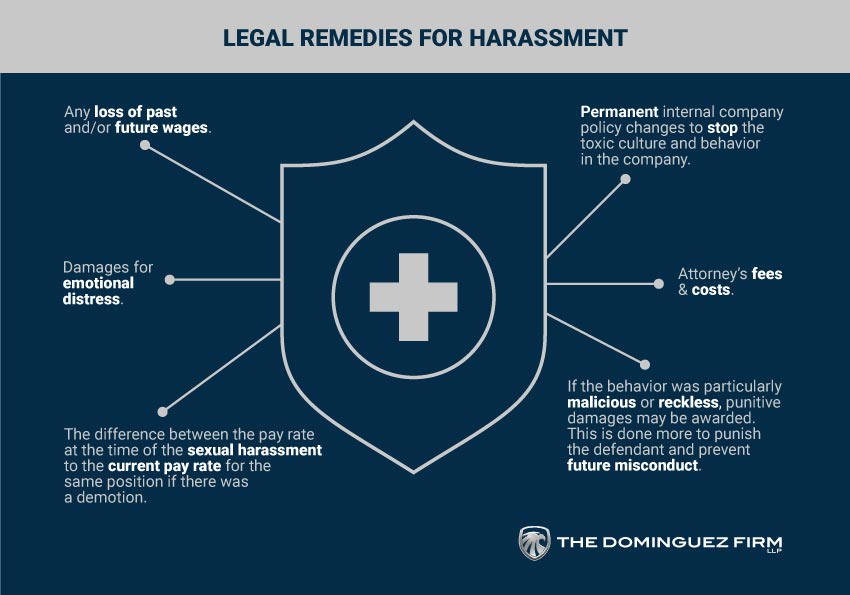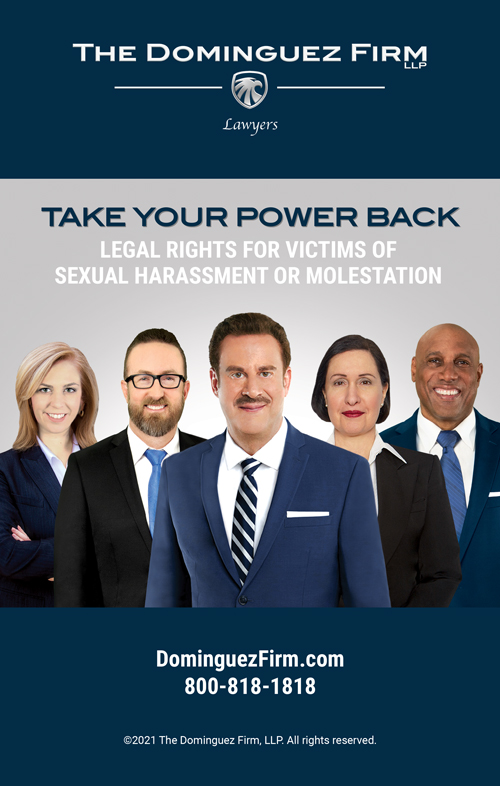
Millions of us go to work or school every day. You may use Uber or Lyft to get there. But if you arrive at your workplace or campus with a sense of dread because someone has been sexually harassing you, it can be unbearable. Even worse, the unthinkable may happen-- you suffer a sexual assault at work, school or while riding in that Uber or Lyft car. You’re left feeling angry and powerless to do anything about it. But know this: it doesn’t have to be that way.
California has strong, clear laws regarding sexual harassment, and they are ever-evolving. Among the new laws that took effect in 2019 are SB1300, which expanded the definition of what constitutes sexual harassment. Under SB 1300, one incident is now enough to sue an employer for sexual harassment if it results in a hostile work environment.
You don’t need to put up with sexual harassment. The experienced lawyers at The Dominguez Firm have successfully handled sexual harassment cases for over 30 years. You can contact us at 800-818-1818 for a free and confidential consultation today. We can help you obtain justice and take back your power too. Know that The Dominguez Firm is here for you during this difficult and stressful time.
What is Sexual Harassment?
According to the U.S. Equal Employment Opportunity Commission (EEOC), sexual harassment is defined as, “unwelcome sexual advances, requests for sexual favors, or other verbal or physical conduct of a sexual nature that explicitly or implicitly affects an individual’s employment.” This definition includes any type of sexual harassment, regardless of gender.
What Types of Sexual Harassment are There?
Sexual harassment falls into one of two categories:
- Quid Pro Quo Harassment – The term comes from the Latin for “this for that”. It’s when a supervisor or co-worker offers a favorable work action, such as a promotion, in return for a sexual favor. It can also mean the threat of a negative work action, such as being fired, if the employee doesn’t accept a sexual proposition, be it from a supervisor or a co-worker. It can be subtle or openly threatening in nature.
- Hostile Work Environment – An employer that allows unwelcome, severe and prevalent behavior of a sexual nature from one or more employees, affecting the ability of other employees to perform their job duties within that workplace.
What Constitutes Sexual Assault or Rape?
In extreme cases, perpetrators may go beyond actions that would be considered grounds for a civil case, such as, for example, making lewd suggestions to an employee. Sexual assault or rape are both grounds for criminal charges in addition to civil charges. There is also a very good chance the victim will be entitled to punitive damages, given the particularly heinous and violent nature of the crime.
- Rape – The crime of rape is defined as non-consensual sexual intercourse through the use of threats, fraud or force. Whether the person was unwilling or unable to consent doesn’t matter. California Penal Code 261 addresses the crime of rape. The exact language can be found here.
- Sexual Assault – Sexual assault is any nonconsensual sexual contact either through force or intimidation. Several sexual criminal acts are classified under sexual assault. Rape or attempted rape are two of them. Unwanted kissing and groping of intimate parts of the body are other examples of sexual assault. Sexual assault does not always have to involve violence to be defined as such, nor is it exclusive to one gender.
Examples of Workplace Sexual Harassment
The following are examples of conduct considered illegal and prosecutable under California law:
- Unwanted or unsolicited touching
- Comments of a sexual nature, for example comments about a colleague’s body
- Sexual innuendo
- Sending pornographic or sexually inappropriate images to a colleague
- Lewd written communication
- Detailing personal sexual exploits while at work
- Repeatedly asking a colleague for a date, after they have turned you down
- Pressuring a subordinate for a date or sexual favors
- Suggesting that a colleague is better or worse-equipped for a work-related task due to their gender
- Intimidating or excluding employees of a particular gender to jeopardize their employment status
- Comments speculating on the sexual orientation of a colleague
- Comments speculating on the pregnancy status of a colleague
- Sexist or insulting graffiti
- Inappropriate invitations
- Leering
- Stalking
- Indecent exposure
This list by no means exhausts possible sexual harassment situations. In general, if you feel in any way uncomfortable in the workplace, and you suspect that your sex or gender may have been a motivator for your abuser, trust your gut and notify management or contact a sexual harassment lawyer.
What Should I Do if I’m Being Sexually Harassed?
If you’ve been sexually harassed, report it to your employer right away. Be aware that here in California, employers with 5 or more employees must have a written anti-harassment policy and provide it to all employees as stated in Senate Bill 1343. This written policy should also outline the steps for reporting sexual harassment within the company. Follow the rules for reporting sexual harassment as outlined in your company’s policy.
You can either approach someone in your human resources department, if there is one or go to your direct supervisor. If the perpetrator is your direct supervisor and there is no human resources department, look for another person in a position of authority to notify.
Keeping records of when the sexual harassment occurred, notes, names and especially witnesses adds strength to your case. It also helps to have a written record of the facts handy as the case progresses, so no details are overlooked later on.
If someone sends you explicit photos, emails, or anything of that nature, save them. You may be very tempted to delete them or throw them out, don’t. As upsetting as they may be, they are crucial pieces of evidence on which to build your case.
What Happens if My Company Does Nothing to Help Me?
Once your employer has been notified of the sexual harassment you’ve been subjected to, they are legally obligated to act quickly to correct it. If they don’t-- or worse, retaliate against you, then call the Los Angeles sexual harassment attorneys at The Dominguez Firm right away.
If you are the victim of employer retaliation, the most effective way to hold them accountable for violating your rights is to seek legal representation. You can be sure your employer will enlist the services of a skilled defense attorney. You’ll want to have an experienced sexual harassment lawyer by your side to take them on.

What Should I Do if My Employer Retaliates Against Me?
First, know that it is illegal for your employer to retaliate against you for filing a sexual harassment complaint. If any of the following has happened to you, you may be able to file an additional claim against your employer for retaliation as well as sexual harassment:
- Reducing your hours
- Being transferred to a new department or location without notice
- Trying to intimidate you into dropping your sexual harassment complaint
- Firing you
- Being given a pay cut
Sometimes, an employer’s retaliation isn’t that obvious. Your employer may suddenly change your work schedule without advising you of it at first. While this may not be an issue for some, it could be for an employee with children or other family members to care for. That is, the shift change may have been intentional to make the employee’s life difficult in retaliation for filing a sexual harassment claim. The employer, however, may claim shift changes are a part of everyday operations within their company.
Whether the retaliation is obvious or subtle, an experienced sexual harassment attorney knows the telltale signs of employer retaliation and how to make them pay for their actions.

In Which Industries is Sexual Harassment Most Prevalent?
According to the Center for American Progress, these were the 10 industries where sexual harassment was most prevalent:
- Accommodation and food services – 14.23%
- Retail sector - 13.44%
- Manufacturing – 11.72%
- Health care and social assistance - 11.48%
- Administrative and support and waste management and remediation – 6.92%
- Public administration – 6.48%
- Professional, scientific, and technical services – 5.73%
- Transportation and warehousing – 4.94%
- Finance and insurance – 3.98%
- Educational services – 3.98%
Much of the press coverage of workplace sexual harassment has focused on people in the media and tech industries. While it has been an issue for people in both of those high-profile sectors, the vast majority of sexual harassment claims have been filed by women, and to a lesser degree, men in blue-collar industries such as manufacturing and food services.
According to the U.S. Bureau of Labor Statistics, women make up the majority of food service, retail and health care employees. Traditionally, low wages tend to be the common thread in all three. There may also be racial biases in addition to gender biases at play in these workplaces, as women of color have a large presence in these three industries. This can lead to power imbalances where those in positions of authority act inappropriately because they believe they can. Fortunately, they are quite mistaken.
With heightened awareness of workplace sexual harassment, in part thanks to the #metoo movement, employers are becoming much more conscious of the consequences of condoning a pervasive culture that turns a blind eye, or worse, encourages a hostile work environment or toxic behavior on the part of some employees.
In spite of all that, sexual harassment in the workplace or on campus still happens. But no matter the sector you work in, you are not powerless and can act if you’ve been subjected to sexual harassment. The award-winning Los Angeles sexual harassment attorneys at The Dominguez Firm are here to help with a free case evaluation.
I’ve Decided to Sue for Workplace Harassment, Now What Happens?
If you have decided to take legal action against your employer for workplace sexual harassment, then congratulations, you’ve done the right thing.
To initiate any legal action for sexual harassment, certain steps must be taken after you have brought the harassment to the attention of your employer. First, you must file an “Administrative Claim” with either the California Department of Employment and Housing (DFEH), the Equal Employment Opportunity Commission (EEOC) or both.
Filing with the DFEH may be enough, but in some instances, filing with the EEOC gives you access to the protection of federal laws as well as state laws. The experienced sexual harassment attorneys at The Dominguez Firm can go over the best options for the particulars of your case with you.
Once you’ve filed your claim with the DFEH and/or the EEOC, you can ask that they conduct an investigation or you can ask for an immediate “Right to Sue” letter. This mandatory step in the process is called “exhausting your administrative remedies”. Sometimes the DFEH declines to investigate and may even pass on your case but issue a “Right to Sue” letter anyway.
Upon receipt of your “Right to Sue” letter, The Dominguez Firm can help you file your sexual harassment lawsuit in civil court.
Who am I Suing, My Employer or the Individual Who Harassed Me?
As to who can be held liable for the sexual harassment you suffered, it depends on the circumstances.
- If you were harassed by a supervisor – Sexual harassment by a supervisor is very much about the abuse of the power dynamic. The perpetrator often believes that you, as a subordinate, will be too scared to do anything about their behavior. In California, employers are strictly liable for any harassment at the hands of supervisors in their employ. If the supervisor is found at fault, then the employer is found to be at fault as well, even if they tried to correct the situation. This is true whether they were aware of the toxic behavior or not. You can also take civil-- and in some cases criminal action against the supervisor directly for sexually harassing you. If the harassment reached the level of being considered a crime, such as sexual assault, then there is the potential for criminal charges as well.
- If you were harassed by a co-worker – A co-worker can be sued individually for sexual harassment. An employer can only be held liable and sued if they knew about or should have known about the sexual harassment and didn’t do anything about it.

What Legal Remedies Are Available to Me for Sexual Harassment?
Our civil court system awards financial compensation, called damages to help remedy any sexual harassment a victim may have endured. Among the damages to which you may be entitled are:
- Any loss of past and/or future wages.
- The difference between the pay rate at the time of the sexual harassment to the current pay rate for the same position if there was a demotion.
- Damages for emotional distress.
- Permanent internal company policy changes to stop the toxic culture and behavior in the company.
- Attorney’s fees and costs.
- If the behavior was particularly malicious or reckless, punitive damages may be awarded. This is done more to punish the defendant and prevent future misconduct.
Conclusion
Pursuing a sexual harassment claim can be a difficult first step, but it’s vitally important that you empower yourself by coming forward. New, stronger laws are now in place here in California to help sexual harassment victims find a voice. Increased awareness thanks to the #metoo movement is also exposing and helping to change long-entrenched beliefs that led to these abuses of power in the first place.
If you or a loved one has suffered workplace sexual harassment, there’s no need to put up with it. Call the sexual harassment attorneys at The Dominguez Firm for a free and confidential case review at 800-818-1818 today. Our firm has over 30 years of experience helping sexual harassment victims find justice and the compensation they deserve. And we stand by our promise: no recovery, no fee.
The days of resigning yourself to the status quo are over. You deserve a safe, stress-free work environment so you can provide for you and your family. The sexual harassment attorneys at The Dominguez Firm are here to help you heal and look forward to a much brighter future.
Helpful Articles Regarding Sexual Harassment:
FREE CONFIDENTIAL CASE EVALUATION
My experience was good. They made sure to kept me in the loop and made sure to let me know what was going on the whole time. My mom has used other attorneys and this experience was beyond better. I would definitely recommend them!
— Ashley Magana
The attorneys were always available and answered my questions. I would recommend them to anyone. Zoe is the best!
— Janet Salazar
My experience with The Dominguez Firm and the attorneys was really good. They were very informative and always returned my calls.
— Jocelyn Gonzalez

